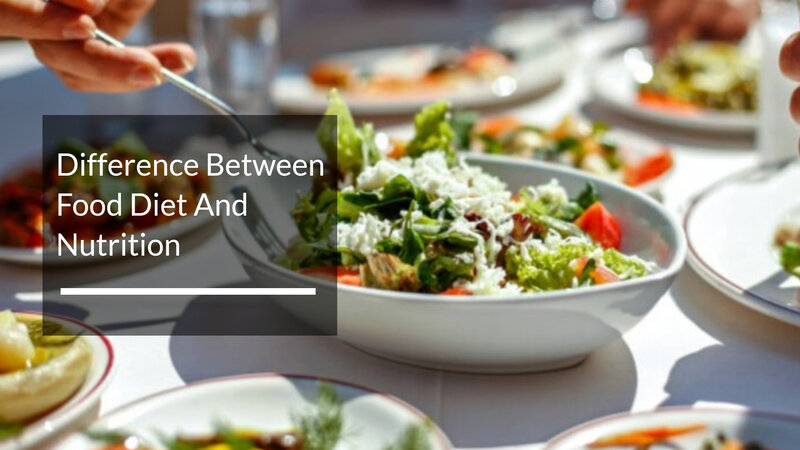Difference Between Food Diet And Nutrition
 Many people get confused about the difference between food diet and nutrition. Here we tell you what food and nutrition are. Read on to learn the basic differences between the main terms in the world of nutrition. We also review the differences between dietitians and nutritionists, as well as other interesting terms related to nutrition and eating.
Many people get confused about the difference between food diet and nutrition. Here we tell you what food and nutrition are. Read on to learn the basic differences between the main terms in the world of nutrition. We also review the differences between dietitians and nutritionists, as well as other interesting terms related to nutrition and eating.
Difference between food diet and nutrition
Although food and nutrition are related concepts, they do not mean the same thing. Food is the action of eating when we are hungry, while nutrition is the biological process that happens within the body after we have eaten, and which is essential for us to perform efficiently and lead a healthy life. Similarly, during fasts, the body can nourish itself by taking advantage of its reserves to create energy.
Food, therefore, is related to eating foods, which can be healthy, such as fruits and vegetables, or unhealthy, such as ultra-processed foods. Eating is consuming food, whatever its characteristics.
In contrast, nutrition is an organic process by which food is processed by the body to obtain the macro and micronutrients it needs to stay regulated. Among the macronutrients, we find hydrates, fats, and proteins, while among the micronutrients we find vitamins and some minerals such as iron or elements such as sodium.
Difference between dietitian and nutritionist
There are also differences between dietitians and nutritionists, although many people think they are the same. Dietitians are food technicians while nutritionists are licensed, nutritionists. Dietitians are dietary re-educators and help patients find a nutritional balance, although they are usually the most sought-after weight-loss professionals.
Nutritionists, for their part, have more extensive training and are health professionals who can help us to create good dietary guidelines, but also to treat problems such as obesity, diabetes, or celiac disease, as well as to adapt the diet to the world of sports or to specific moments in life, such as pregnancy.
In this way, if we have a fairly healthy diet and we do not have problems related to eating, we can go to a dietician to lose those extra pounds that we have gained at any festivals or outing if we consider that we need professional help. In the same way, if we have an obesity problem, a bad relationship with food or we want to establish specific eating guidelines to be able to perform better in sport, a nutritionist is the best option to start improving our health as soon as possible.
Difference between autotrophic and heterotrophic nutrition
Autotrophic nutrition is one in which an organism is capable of producing its own food. Vegetables, for example, are capable of synthesizing all the substances that are necessary for their metabolism from inorganic substances.
On the other hand, heterotrophic nutrition is one in which a living being feeds on other living beings to obtain the energy they need to survive. Heterotrophic nutrition is the process by which these substances are transformed into organic molecules through this same nutritional process. Heterotrophs can themselves be consumers, as is the case in humans, or decomposers.
Difference between endocrine and nutritionist
Endocrinologists are professionals who have clinical knowledge about nutrition and diets, but always relating them to pathologies. Nutritionists are professionals trained to design healthy eating patterns and guide each person on what foods to include or eliminate from their diet.
Endocrinologists specialize in the study and treatment of diseases of the endocrine system, which is responsible for producing hormones that regulate different functions and that have a totally direct relationship with nutrition. Visiting the endocrinologist is essential if the nutritional treatment that we are following with a nutritionist is not working for us, because in this way we can check if we have problems with hormonal alterations that are preventing us from improving our health even if we take care of our diet.
Difference between enteral and parenteral nutrition
Enteral nutrition is one by which nutrients are administered to the digestive system. This nutrition can be oral, when food is consumed by mouth, or by tube, in case the first type of nutrition is impossible for various reasons, such as in the case of an illness or operation. In order to use this type of nutrition, it is necessary for the digestive system to function, if not totally, at least partially.
Parenteral nutrition, meanwhile, is the administration of nutrients through a vein. It is a type of nutrition that is used in cases in which it is necessary to introduce nutrients or energy into the body of those people who for various reasons cannot eat due to a normal diet, and other options such as enteral tube nutrition are ruled out. . Parenteral nutrition is designed for times when the digestive system cannot be used or when digestive rest is required. If the digestive system works only partially, for example in the case of some sick babies, parenteral nutrition is the best alternative to complete the nutritional process.
Each of the techniques has its pros and cons, but enteral nutrition is used whenever possible since it has fewer complications and is more similar to the natural feeding process.
Difference between malnutrition and improper nutrition
According to the WHO, malnutrition is when the intake of calories and nutrients through diet is lower than necessary. In the same way, incorrect nutrition does not have to be deficient but can mean a lack of some nutrients and an excess of others. In this way, we can have incorrect nutrition even if we eat in sufficient quantity, if we eat food that includes an excess of some nutrients and a deficit of other vitamins and minerals considered essential.
In this way, it is possible to eat in large quantities, and even be overweight and obese, so that we could not consider ourselves malnourished, but at the same time have incorrect nutrition, if we eat ultra-processed foods that do not provide the nutrients that our body needs to function in a healthy way.



